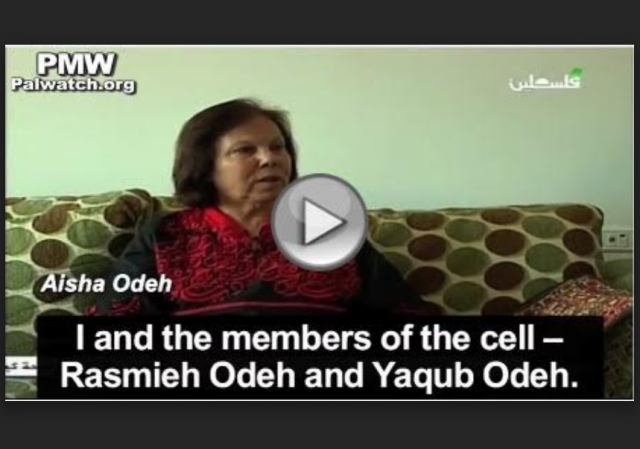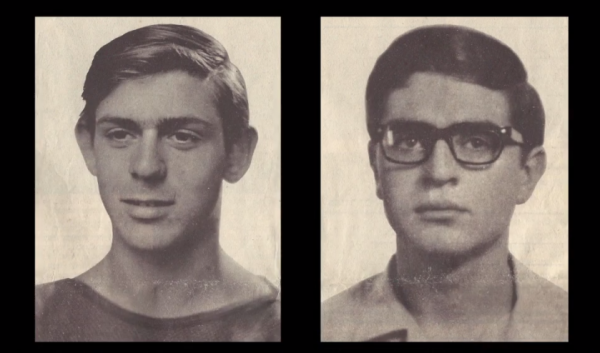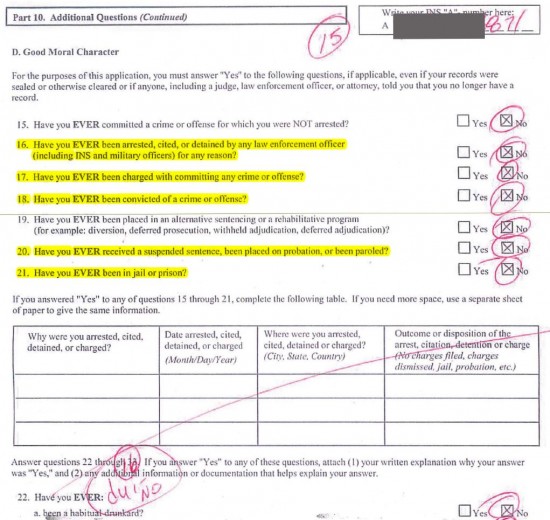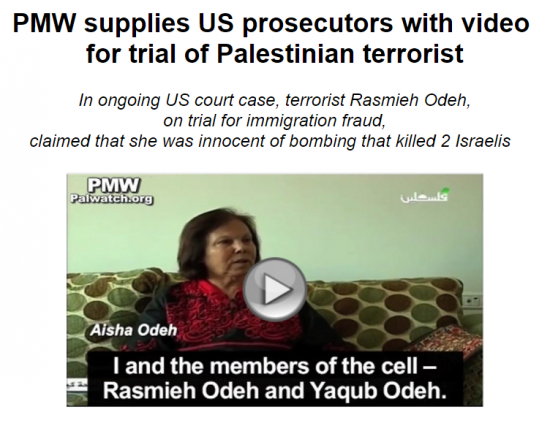New VIDEO surfaces implicating Rasmea Odeh in deadly supermarket bombing
Additional proof for upcoming re-trial of Rasmea for immigration fraud.

Rasmea Odeh is the military member of the Popular Front for the Liberation of Palestine (PFLP) who was convicted in Israeli in 1970 of the 1969 bombing of the SuperSol supermarket in Jerusalem, and the attempted bombing of the British Consulate.
That supermarket bombing killed Israeli students Edward Joffe and Leon Kanner.

(Edward Joffe and Leon Kanner)
Rasmea claims she was not involved in the supermarket bombing, and was convicted only because she gave a false confession after 25 days of sexual torture.
Previously, we have explored the factual conflicts in Rasmea’s story, including that she confessed the day after arrest, not 25 days later; bomb-making material was found in her room; she received an open trial observed by a representative of the International Red Cross who described the trial as fair; and perhaps most important, Rasmea’s co-conspirator, Ayesha Odeh (not related), described in a 2004 interview for a pro-Palestinian filmmaker how Rasmea was the mastermind behind the supermarket bombing.
After serving nearly a decade in prison, Rasmea was released in a prisoner release for an Israel soldier captured in Lebanon. While she was imprisoned, the PFLP formed the “Rasmea Odeh Brigade” to try to free her and others by taking hostages, and Rasmea was on the list of prisoners whose release was sought by the Black September terrorists who took Israeli athletes hostage (and killed them) at the 1972 Olympics.
Yet Rasmea claims she was not involved in terror organizations and was just an innocent political activist when arrested by the Israelis.
Rasmea eventually made her way to the U.S. in the mid-1990s. Rasmea gave false answers on her visa application, and in 2004 on her naturalization application, by denying (among other lies) that she EVER (bold and CAPS in original) was convicted or imprisoned.

(Yellow Highlighting Added)
Rasmieh was convicted of immigration fraud in November 2014.
Just days ago the trial court ordered a new trial so that Rasmea could testify that she only confessed because of 25 days of torture which caused her to suffer PTSD. That PTSD, Rasmea’s expert will testify, caused Rasmea to “filter” the questions on the immigration forms such that “EVER” was understood by her to mean only since coming to the U.S. in the 1990s. Thus, Rasmea will argue, she did not “knowingly” give false answers, which is an element of the criminal offense.
The expert testimony, which amounts to junk science, never should have been allowed and Rasmea should not have been given a new trial, for reasons we have explained before. But the Judge ruled as he did, and it’s moving forward to a new trial in January 2017.
At that trial, unlike the first trial, Rasmea’s guilt or innocence of the bombing will be an issue, though it still isn’t an element of the immigration charge, because Rasmea claims she only confessed due to 25 days of torture. (Whether she did the bombing or not, she still needed to disclose the conviction and imprisonment.) The prosecution has argued in court papers that Rasmea is lying, and that the prosecution will prove so in the next trial.
Because the prosecution did not need to address the torture allegation in the first immigration trial, we don’t know what else they have as to the underlying bombing and confession. We do know, based on court filings, that they obtained the complete Israeli trial record pursuant to treaty, and that those records are admissible in U.S. courts.
An important new piece of evidence just surfaced, a second video in which Ayesha Odeh again implicates Rasmea in the supermarket bombing they carried out jointly.
This second interview was on Palestinian TV in 2013. The video was obtained by Palestinian Media Watch.
Palestinian Media Watch has supplied US prosecutors with a video of Palestinian terrorist Aisha Odeh admitting on Palestinian television that she placed a bomb in a Jerusalem Shufersal supermarket in 1982, which killed two Israelis. She also stated that her accomplice was Rasmieh Odeh. Both terrorists served 10 years of their life sentences in Israeli prisons, until they were released in a prisoner exchange in 1979.
Rasmieh Odeh is going on trial in the United States in January a second time for immigration fraud. She claimed among other things that she did not commit the bombing, and that she admitted to it in the Israeli courts only following weeks of torture.
As the Jerusalem Post reported today:
“Most significantly, the decision means that Rasmea Yousef Odeh will get to argue that her confession and conviction in Israel came as the result of torture by Israeli security forces – potentially putting the Shin Bet (Israel Security Agency) itself “on trial” in a US court… Odeh’s supporters claim that her original trial in Israel was marked with ‘bias and inconsistencies,’ and that Odeh confessed her involvement in terrorism only after she was tortured by security authorities.”
[The Jerusalem Post, Dec. 8, 2016]However, the video PMW supplied last week to prosecutors shows the terrorist Aisha Odeh admitting to the bombing on PA TV, and saying her accomplice was Rasmieh Odeh.
Here is the video and transcript (via PalMedia Watch) [Update 12-14-2016 – the post have been removed – the post but not the video is available in Google Cache, also the video below was substituted for the original video]:
Aisha Odeh: “Immediately after the 1967 war (i.e., the Six Day War) we changed [the name] from the Arab Nationalist Movement to the Popular Front for the Liberation of Palestine. We were organized. We engaged in resistance to the occupation in all its forms… I turned to involvement in armed activity. We carried out an operation (i.e., terrorist attack) in western Jerusalem on Feb. 22, (sic., 21,) 1969.”
Official PA TV host: “When you carried out the operation and afterwards, how were you arrested?”
Aisha Odeh: “Of course Israel arrests many people in such situations… They gathered information and found evidence that led to the people who carried out the operation… A year later I was tried, I and the members of the cell – Rasmieh Odeh and Yaqub Odeh.”
Official PA TV host: “Are you all from the same family?”
Aisha Odeh: “No, Rasmieh Odeh and Yaqub Odeh are from Lifta. I am from Dir Jarir. In addition there were Samia Al-Tawil and Mahmoud Al-Ubeid. The five of us were tried together, even though I had no connection to any of them aside from Rasmieh. Yaqub Odeh was sentenced to 3 life sentences, Rasmieh Odeh was sentenced to 3 life sentences, and I was sentenced to 2 life sentences… One life sentence for carrying out an operation, one life sentence for not reporting the operation, and ten years for my membership in the [PFLP] organization…”
Official PA TV host: “Israelis died [in the bombing].”
Aisha Odeh: “We placed two bombs. One bomb exploded and one bomb was discovered a few moments before it exploded. Two were killed and 10 (sic., 20) were wounded.”
[Official PA TV, In a Fighter’s Home, Aug. 27, 2013]
Added with the other evidence of Rasmea’s guilt, the preposterous “filtering” theory, and the additional evidence the prosecution will present, perhaps the jury will conclude that Rasmea had every incentive to knowingly lie on her immigration and naturalization forms.
Donations tax deductible
to the full extent allowed by law.









Comments
Allowing PTSD to affect determination of criminal intent seems a very bad precedent because its existence and severity is inherently subjective.
That’s not to say PTSD doesn’t exist, but just to say that it- like pain- is subjective. No one other than you knows how bad your pain really is (or, absent physical evidence, that you are experiencing it). There are no pain-o-meters, just as their is no PTSD-o-meters, and so evaluations must rely on self-reporting.
If any defendant can make a lack-of-criminal-intent claim due to PTSD and if there are no objective methods to determine the truth of such claims, then what prevents it (like the proverbial “ignorance of the law”) from being used as an all-purpose defense against which there may be doubt but can be no actual rebuttal?
I don’t see how her guilt or innocence of the bombing is relevant to this trial, any more than it was relevant to the last one. Surely the only new element here is her claim to have been tortured, and as a result to suffer this new and highly selective form of PTSD, which led her to misunderstand the questions on her naturalization paperwork. How does her guilt or innocence of the bombing (and therefore the truth or falsity of her confession) come into it?
Are you claiming that since we know she was guilty therefore she couldn’t have been tortured into confessing? How does that follow? Surely there are many guilty people who refuse to confess, and might be tortured into it. It’s commonly claimed that confessions obtained by torture are not reliable, but nobody claims that they are guaranteed to be false! It may be true that torture will make even an innocent person confess, but if so it will surely do so to a guilty one as well. So as I see it her guilt is still irrelevant, and therefore this new video can’t be admitted.
It seems to me that the most powerful piece of evidence against her claim is the timeline — she can’t have been tortured for 25 days unless Shabak has mastered time travel.
I don’t believe torture is relevant to this case either…given she and the Red Cross are on record as saying there was nothing untoward to start with (well, apart from her murderous attack that is).
Perhaps someone could ask her why she thought it was ok to kill Jews for the crime of being Jewish?
Mailman
The allegation of torture is relevant because it’s the explanation she’s giving for having answered falsely on her citizenship application.
The question you suggest would not be relevant because she isn’t on trial for killing Jews. In fact the appeals court was concerned that the original jury had been told her victims’ names, and particularly that the translator had rendered the standard Hebrew term ז״ל literally, as “may his memory be for a blessing”, rather than idiomatically as “the late”, thus perhaps biasing jurors against her. Ideally the jurors wouldn’t know what she’d been convicted of, just that she had been convicted of a crime, perhaps parking in a handicapped space, or removing the tag from a mattress.